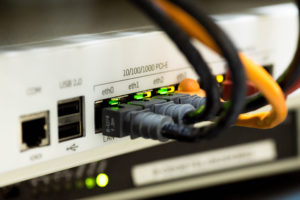What is an IP address?
Why it matters
While there is a technical reason for an IP address, they are also used to monitor your activity online. In an environment where cybersecurity is a hot topic, it seems strange that a number which not only identifies you but is also connected to all your online activity, should be publicly accessible.
By hiding your IP address you can browse knowing that your activity is not being traced, providing a level of anonymity online and ensuring that your online sessions remain private.
Other benefits of hiding your IP address include:
- Hiding your geographic location
- Circumventing restrictions on free speech
- Accessing geo-blocked content on sites while abroad
- Preventing the misuse of personal information
While hiding your IP address might sound complicated, it is much easier than you think. Here are three ways to hide your IP address and improve your online security.
1 – Use a proxy

Web proxy server options are numerous and readily available. The process is simple – instead of connecting to the internet directly, the user instead connects to an intermediary proxy server. This means that the user never connects directly to the site they are visiting, masking their identity.
While this method does effectively provide anonymity, your IP address is not entirely hidden as it is visible before joining the proxy server. In addition, most services do not offer any more security than a standard connection, meaning that data could still be intercepted, making security a big concern.
What’s most important to bear in mind is that the web traffic of most proxy servers is logged, so your activity is likely to be fully traceable with minimal effort. The method is also easily detected with simple tools like WhatIsMyIP,which have specific tools for identifying if a proxy server is being used.
While proxy servers are useful for masking geolocation, the lack of encryption means that a web proxy is not likely to be suitable enough for any activity that requires a secure connection, such as online banking or shopping.
2 – Try Tor

A free, open source browser solution, Tor allows users to download their software and use it in the same way as they would use Chrome or Firefox. When using the dedicated browser, you can use the Tor network to make sure that your browsing online remains anonymous.
This service bounces your communications around their network of servers, making it difficult to monitor an individual’s activity.
However, Tor’s encryption is not end-to-end, so secure information should not be shared over the service. The encryption Tor does offer is limited, meaning that traffic entering and exiting Tor servers is vulnerable to breaches.
As Tor has become infamous, with its anonymity service often being used for illegal purposes, a number of sites now block or limit functionality for people using Tor nodes. This can mean that Tor users may experience poor speed and performance in some instances.
As a free and easy to use tool, Tor is a good solution for masking your identity, but with slow speeds and possible restrictions, it may not be useful for high bandwidth activities like streaming. Most importantly, without end-to-end security, it should also not be used for anything that involves sensitive data.
3 – Add a VPN

A Virtual Private Network (VPN) hides your IP address and adds a solid layer of security, by creating a ‘tunnel’ with end-to-end encryption between your device and one of the service’s many worldwide servers. This ensures that if your data is intercepted, a hacker would only be able to see a string of nonsensical letters and numbers rather than legible personal information.
While your ISP will know that you are using a VPN service, they will not be able to identify your activity, your IP address, which devices you are using or even where you are connecting from. All that will be visible while you are in the ‘tunnel’ is the VPN server’s IP address.
There is a lot of choices available with VPN services, though most are very easy to setup and use. Whether you need a VPN for Mac or PC, or to hide the IP address on your Apple or Android phone, look out for providers who offer simple apps that you can use across all your devices.
While a VPN will provide high levels of security as well as hiding your IP, it is not totally anonymous. Many countries require service providers to log user activity, which can be requested by the authorities if required.
Ultimately, there are numerous ways to hide your IP address and many benefits for doing so. Even if it is just for the piece of mind that you have an extra layer of protection in your security setup, it is a simple step that is becoming increasingly popular.
Choosing a tool can be complicated as there are many varieties of each solution for different situations and requirements, so take the time to choose carefully and pick the one that best suits your needs.
–
Credit: techshout.com




